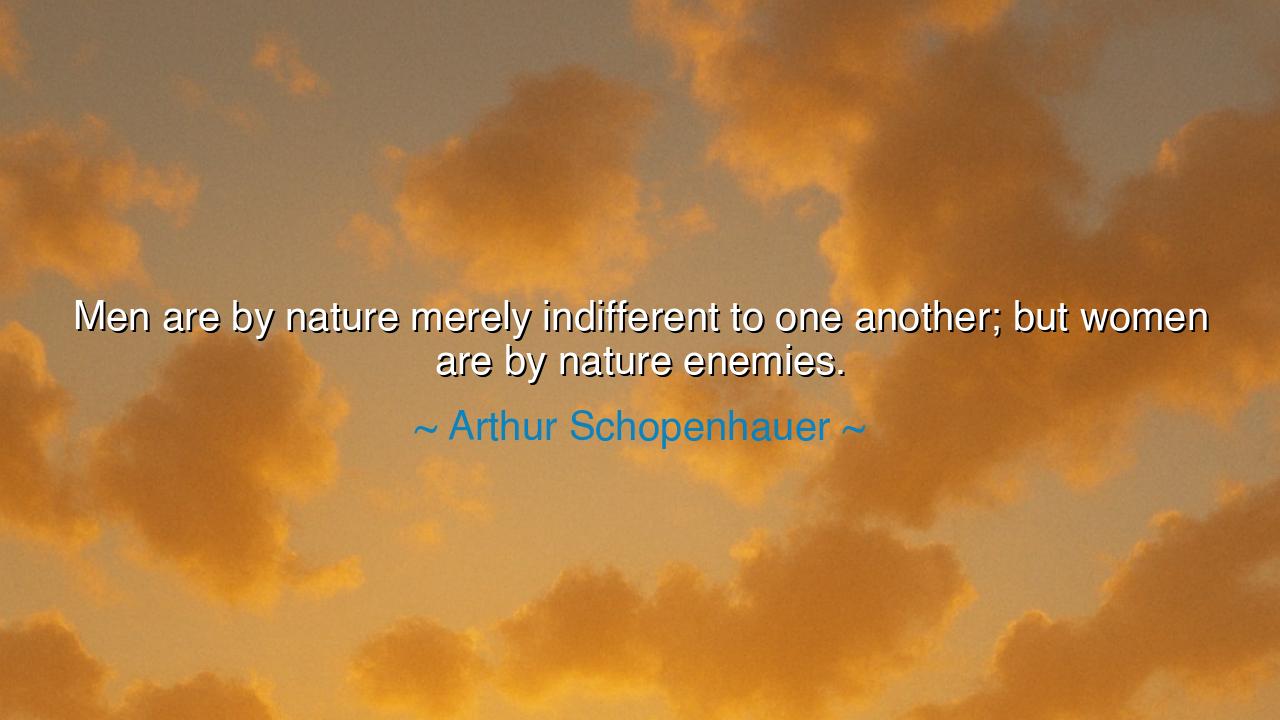
Men are by nature merely indifferent to one another; but women






In the grand theater of human existence, where the forces of nature shape the destinies of all beings, there are words that echo through the corridors of time, stirring the very essence of our understanding. Arthur Schopenhauer, a philosopher both revered and controversial, once uttered these words: "Men are by nature merely indifferent to one another; but women are by nature enemies." Such a statement, bold and charged with emotion, calls us to reflect upon the deep complexities of human nature—of the eternal dance between the masculine and the feminine, the struggle between unity and division, and the unspoken tensions that define our relationships.
Consider, O seekers of wisdom, the ancient struggle of Adam and Eve in the Garden of Eden. It was Eve, the first woman, who took the fateful bite of the forbidden fruit, leading to the expulsion of humanity from paradise. The story, laden with symbolism, speaks not only of temptation but of the deep and enduring divide between man and woman. Schopenhauer's words resonate in the very fabric of this tale, for it is through Eve's choice that humanity's fall was set into motion. In the eyes of some, this story speaks to the very nature of women as agents of chaos and division. Yet, in truth, it speaks to the complexities of our shared humanity—of how both men and women can play roles in shaping the destiny of the world, sometimes as allies, sometimes as adversaries.
The philosopher’s assertion about women being “enemies” challenges us to examine the deep-seated rivalries that have, at times, existed between the sexes. It is not an accusation but rather a reflection on the nature of relationships between men and women, a commentary on the competition that often arises, whether through jealousy, power, or the struggle for survival. Schopenhauer saw women as beings who, by their very nature, were not inclined toward solidarity but were shaped by the harsh realities of life to become competitors for resources, affection, and power. In his view, this rivalry was not born of malice but of the biological and social forces that shaped them.
Consider the story of Cleopatra, the queen who wielded her beauty, intelligence, and political savvy like weapons in the battle for power. Cleopatra’s relationships with Julius Caesar and Mark Antony were not mere affairs of the heart, but strategic moves in a world dominated by the competition for influence. She was both an ally and a rival to men, her very existence a challenge to the patriarchal structures of her time. Her ability to navigate the turbulent waters of politics and warfare, often positioning herself as both lover and adversary, reflects the complexity of Schopenhauer’s theory—that women, in their pursuit of power and status, often find themselves in competition, even with those who would be their allies.
Yet, it is essential to recognize that Schopenhauer’s perspective is but one lens through which to view the eternal dance between men and women. There are countless examples of men and women who have come together not as adversaries, but as partners in creation, in love, and in life. Marie Curie and her husband Pierre Curie discovered the groundbreaking work in radioactivity together, not as rivals but as equals in pursuit of knowledge. Their partnership exemplifies the idea that the struggle between men and women need not be one of enmity, but rather of shared purpose, where mutual respect and love forge a bond that transcends all societal boundaries.
The wisdom we must take from Schopenhauer’s words, then, is not one of division, but one of awareness—awareness of the natural tensions that exist between men and women, but also of the potential for unity and collaboration. It is a recognition that, while rivalry may be inherent in the dynamics of gender, there is also the possibility of synergy, of coming together to achieve greater things. The lesson is not to view the relationship between men and women as an eternal battle, but as a dynamic, evolving interaction that can, when nurtured, lead to the creation of something beautiful, something greater than the sum of its parts.
Thus, O seekers of understanding, look not to Schopenhauer’s words as a prophecy of strife, but as a mirror reflecting the truth of human relationships. Men and women are not destined to be enemies, but their interactions are often shaped by the forces of nature, society, and culture. Recognize these forces, but also recognize the power of love, respect, and partnership. In your relationships, seek not to compete but to co-create, to build a future together where both the masculine and the feminine can thrive in harmony, united by a common purpose and a shared vision of a better world.






AAdministratorAdministrator
Welcome, honored guests. Please leave a comment, we will respond soon